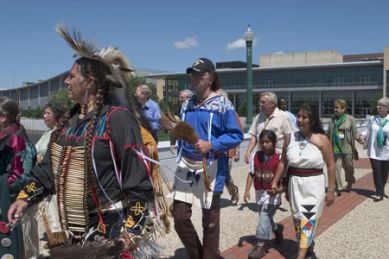WCRC Affirms Call to Communion, Commitment to Justice

A call to communion and a commitment to justice were what some 300 delegates of the newly formed World Communion of Reformed Churches (WCRC) adopted at the conclusion of their ten day summit in Grand Rapids, Mich.
Describing themselves as a group that is "bound to God and to one another through our baptism and called into unity as disciples of Jesus Christ," the WCRC, which represents some 80 million Protestants in 230 churches worldwide, declared that their communion is for the "sake of the world's transformation" and affirmed that their "identity as God's people" commits them to the "work of God's justice."
"In the face of the global divide between rich and poor, and the suffering of the earth, we heard the Gospel of reconciling love and prepared ourselves to respond in joyful hope," the delegates wrote.
The WCRC was officially formed on June 18 in a merger between the World Alliance of Reformed Churches (WARC) and the Reformed Ecumenical Council (REC) on the first day of the Uniting General Council (UGC) conference.
According to WCRC General Secretary the Rev. Setri Nyomi, the term 'communion' in the group's name points to a new form of working relationship where participants "recognize our common baptism and our togetherness at the Lord's table - making us better witnesses and more effective in making a difference in the world."
"In these times of division and dissension in so many areas of our lives – including church life – it is highly significant that two global groups of churches […] should be willing to come together in a higher level of union than ever before," added former REC General Secretary the Rev. Dr Richard van Houten, who is now retiring from his ecumenical work.
Several prominent leaders from the faith community, including World Council of Churches General Secretary the Rev. Olav Fykse Tveit and Pope Benedict XVI congratulated the WCRC's delegates on the formation of their new body.
"This is a new expression of the visible unity of God's church, and as such it represents both a gift from God and a sign of hope," said Tveit, who noted that he hopes for a strong partnership between the WCC and the WCRC.
"I trust that it will strengthen the contribution of the Reformed churches to unity, peace and justice," he added.
Benedict, meanwhile, assured the delegates that the "Lord will never abandon his disciples in the quest for unity," and commended the Reformed churches for the "ecumenical progress" signaled by the emergence of their new communion.
REC President Peter Borgdoff said that Benedict's letter was a "welcome signal that the Vatican has taken interest in what we are doing."
The UGC also saw the election of several key WCRC leaders, including its new president, Jerry Pillay of the Uniting Presbyterian Church of Southern Africa.
"I came here as a mere delegate, with no intentions or aspirations, and I walk away as president," Pillay told the delegates.
"In all humility, I thank you for your trust. With God's grace, I will do this job, realizing I am unequal to the task of those who served as presidents of the World Alliance of Reformed Churches and the Reformed Ecumenical Council," he added.
"I will learn from them, but my only desire is to walk in the steps of Jesus Christ, led by his Spirit."
Besides Pillay, other officials elected included Vice President Lu Yueh Wen of the Presbyterian Church in Taiwan; Vice President Yvette Noble Bloomfield, deputy general secretary of the United Church in Jamaica; Vice President Bas Plaisier, minister in the Hague in the Protestant Church in the Netherlands; Vice President Helis Barraza Diaz, member of the Presbyterian Church of Colombia; and General Treasurer Gottfried Locher, incoming president of the Federation of Swiss Protestant Churches.
Along with settling the structure of the WCRC, delegates held lengthy discussions on key issues that the organization will address including the Accra Confession, which is a faith-based critique of the free market economic system.
Rev. Christian Isso, a Presbyterian pastor and advocate of the confession, said that the 2004 document predicts the global financial meltdown that has occurred in many countries over the last year or so.
"The Accra Confession tries to interpret the reality of the global economy, and how it hurts millions upon millions of people, from a faith perspective. Economics are a matter of faith," Isso said.
Others, however, have said that the document goes too far and is too stark in criticizing people who have helped run the economies of prosperous nations.
Other highlights of the conference included discussions about the role of women and youth in the Communion as well as dialogue with several local Native American tribes, who asked the WCRC to "rescue the Christian faith from the cowboys," as one delegate put it.
Solidarity with indigenous peoples "is a serious step and churches... will need address and accept this," said Clifton Kirkpatrick, former president of WARC.
"The direction that the new World Communion of Reformed Churches (of reconciliation with Indigenous peoples) is taking is the direction we need to go," said Richard Twiss of the Lakota Sioux tribe. "I'm so grateful we have been given a role in its initial stage ... A lot of hard work, pain, grieving, and compromise is in front of us. But today is a wedding feast."
Following the UGC, the WCRC will establish a strategic planning committee to help "unpack" all that was discussed and acted on during the summit.
"We need to be where Jesus chose to be, namely among the poor and oppressed," Pillay said during the summit's final worship service.
"God's presence in the world tells us that business as usual is no longer acceptable."